| Article Overview:
Baghdad Bob stands up and reports the news as he sees it without
blinking an eye. He's the prime target for many snipers,
for he's Iraq's Information Minister. Find out how Baghdad
Bob stands up to U.S. and Allied war correspondents, and whether he
deserves a plaque when he dies. |
 VigilanceVoice VigilanceVoice
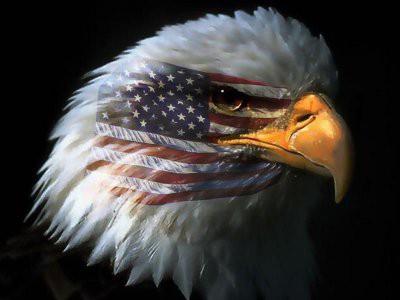
www.VigilanceVoice.com
Tuesday--April
8, 2003—Ground Zero Plus 573
___________________________________________________________
Will We Cry When We Kill Baghdad
Bob--Iraq's Top War Correspondent?
___________________________________________________________
by
Cliff McKenzie
Editor, New York City Combat Correspondent News
|
GROUND ZERO, New York City, Apr. 8-- War's ultimate price is death.
It isn't surprising then, that journalists covering the war die.
Sometimes it only surprises journalists.
Some 600 journalists are "embedded" with
coalition forces fighting in Iraq. To date, six have died in a
combination of accidents, combat deaths and land mine explosions.
NBC's David Bloom died of a pulmonary embolism, and Michael Kelly,
former editor-in-chief of the Atlantic Monthly, was the first American
journalist to die in Iraq.
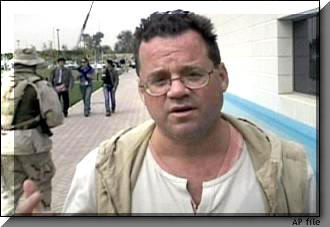 |
|
Michael Kelly,
editor-at-large of the Atlantic Monthly, in Iraq , March 11,'03 |
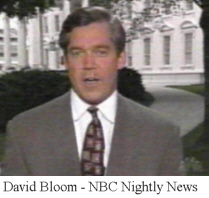 |
Kelly, 46, was embedded with the Army's 3rd
Infantry Division when his Humvee came under Iraqi fire. The
driver's evasive actions caused the vehicle to roll over. It was
trapped in water for over 25 minutes, Army spokesmen said.
Both Kelly and the driver were killed.
Kelly's death represents the risk reporters face
when they ferret out combat news. As the former
editor-in-chief of the Atlantic Monthly and New Republic, Kelly had
achieved a peak in his career. From some viewpoints, he didn't
need to prove his worth as a reporter. In 1991 he covered the
Gulf War and wrote a book, Martyr's Day. He was fired as
editor-in-chief for the New Republic for his attacks on President
Clinton. He left the Atlantic Monthly after revitalizing it to
write a book, and when the war broke out, jumped at the chance to
embed himself so he could write another book.
David Bloom was also deemed a shining star of
international journalism. The NBC network devoted a full day of
tribute to him, noting his heroism and his grace as "man with a
mission" to report the news. Two British and one
Australian journalists have also died.
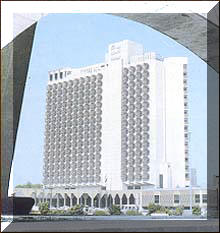
|
|
The Palestine
Hotel was attacked by U.S. forces |
This morning, the Palestine Hotel was attacked by
U.S. forces after receiving sniper fire from one of its floors.
Five journalists were wounded, one seriously, and one killed in the
retaliatory strike by a U.S. tank against sniper fire.
Arabic reporters are not exempt from death.
Al-Jazeera, the major Voice of the Iraqi people and Arabic news,
reports that Tareq Ayoub died as a "martyr of duty" when a U.S. air
strike mistakenly hit the satellite T.V. network office located on a
road along the Tigris River that links the Information Ministry with
the old palace presidential compound. The network's cameraman,
Zuhair al-Iraqi, was wounded.
Al-Jazeera broadcast pictures of American POW's
being interrogated by Iraqi's, plus explicit photos of American dead
bodies.
However, in keeping with the open-book policy for
international news coverage of the war, the U.S. includes al-Jazeera
in all press briefings. It has a front row seat, ahead of
the New York Times.
While there is a great deal of tribute being paid
to journalists braving the dangers of combat to report stories, one
particular journalist stands out in my mind.
He, in his own way, is the bravest of them all.
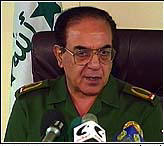 |
|
Mohammed Said
al-Sahhaf, Iraq Information Minister |
His name is Mohammed Said al-Sahhaf.
He is the Iraqi Information Minister.
Almost daily, he stands in the open and
broadcasts information about how the U.S. and coalition forces are
losing the war. When U.S. tanks were parked in front of Saddam's
presidential palace, the Information Minister was telling the viewing
public how Iraqi forces had driven the Americans from Baghdad.
Broadcasting next to the Palestine Hotel where
journalists from throughout the world are clustered, Mohammed
al-Sahhaf represents a prime and easy target for "decapitation."
His face, however, continues to be among the most recognized Iraqi
faces of the war.
One can't help but appreciate the stone-faced
lies Mohammed al-Sahhaf issues. To hear his comments, one
would think American and British troops were on the run, and Iraqi
Special Guard troops were in victorious control over Baghdad and all
other key Iraqi cities.
It would be easy to discount the
Information Minister as being foolish or even "insane" for exposing
himself to virtual "instant death" each time he speaks.
Or, one could issue the Minister a series of kudos, extolling his
bravery and his commitment to issue the best of news up until the last
moment.
There is probably no other news reporter
who has daily taken as many risks as he has, for each time he pops up
his head, he risks being blasted by air strikes, killed by tank
blasts, or eliminated by snipers. Some might say Baghdad Bob, as
he is coined by the news media, is the bravest of all journalists.
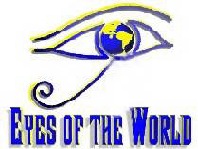 |
|
The news media
represents....... |
Then there is another important factor
about the news media. The news media represents the eyes
of the world. The United States and Britain invited the
world to watch the war from their reporter's viewpoints.
The only censorship imposed is releasing the exact position of any
unit, or its movements toward an objective.
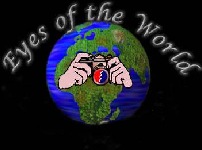 |
|
.......the
Eyes of the World |
Otherwise, the media from any country
can say what it wants. Peter Arnett, for example, was fired by
NBC and National Geographic, not by the U.S. government for his
interview with Arabic news saying how the U.S. war plan was failing.
Al-Jazeera, the media that sits
in the front row of all briefings, is one of the harshest critics of
American policy and maintains a high profile in the news gathering
world of the embedded press corps.
One could easily say that the
United Nations is witnessing the war through the cameras and lenses of
its individual reporters. Every major country is
represented, plus hundreds of other media representatives. This
morning there was a tribute to the "embedded journalists" in the China
Post, written by Dr. William Fang.
 |
As a former combat
correspondent, I know the excitement of reporting the news from the
front lines. For many, there is no more exhilarating
feeling than putting one's self at risk for a story--to be witness to
the dangers of war and as vulnerable to dying for the story as the
warrior next to is to die for his country.
But I keep going back to
Baghdad Bob.
In his own way, he's a
Sentinel of Media Vigilance.
He has more courage than
most can imagine, for he appears to be fearless when it comes to
facing the truth. He refuses to accept it.
Then, there is his conviction. He isn't intimidated by U.S.
tanks sitting on Saddam's palace steps, or U.S. troops crossing
bridges, or bunker bombs blasting all around. Then,
there is this thing called Complacency. It just doesn't
seem Baghdad Bob has any room in his body for Complacency--he just
doesn't flinch.
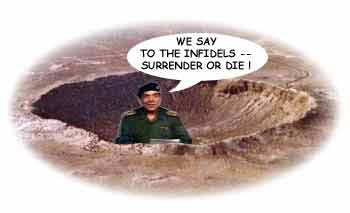 |
|
Baghdad Bob
unflinchingly reporting the Baghdad news |
I wonder if maybe Baghdad
Bob isn't really Saddam Hussein with plastic surgery. Who
else could stand up to the truth with more blindness than Saddam
himself?
I don't mean to
depreciate the strength of Baghdad Bob.
Many might criticize him
as being a propaganda puppet, but then many of the world press claim
that Fox News, and American journalists in general, are waxing softly
the American role in the war, presenting only one side, white-washing
the brutality of it that al-Jazeera reports.
They are saying that Baghdad
Bob and NBC may not be too far apart, for it was NBC that fired Peter
Arnett, gagging, what many would call the other side of the truth.
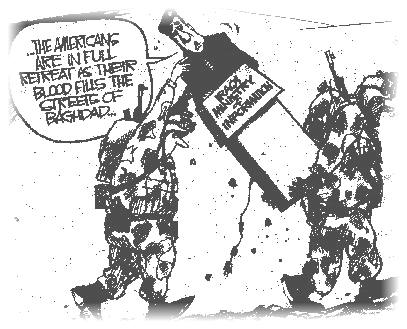
|
|
Baghdad Bob
deserves credit for his convictions |
Some claim it takes
incredible guts and massive courage for Baghdad Bob to stand on a roof
or in an open air forum and issue reports of Iraq's defiance and
victory when all around the smell of death and defeat strangle one's
senses, and make it clear the end is not only near, but may have
already passed.
I guess I hope they don't
kill Baghdad Bob.
While he may not be run
up the flagpole as a journalistic hero, he certainly deserves credit
for his convictions. He has reported his news with
unflagging devotion, and, if a journalist is measured by doggedness
and commitment to filing stories, then Baghdad Bob has earned the top
award in his field.
Odds are, however,
Baghdad Bob won't make it. He'll probably file his last
story in a cloud of dust and fire. I'm sure he'll be
announcing that U.S. troops have been banished from Baghdad even as
the last bullet is fired. For that, he deserves some
recognition.
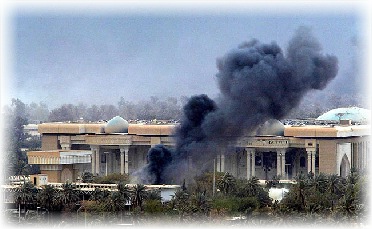 |
|
War means
destruction: Palace of the Republic hit |
And, he's certainly not
afraid to die.
When war correspondents
become alarmed that one or more of them get killed, its oxymoronic at
best. War means death. War means destruction.
War correspondents deal
in death--reporting it. Daily, American news-briefers are
hounded by the press to issue casualty figures, for the measure of any
war is the number of people killed and wounded, both civilians and
military.
Blood writes brutal
stories.
The more blood, the
more brutal the story.
So when journalists
die in war, it shouldn't be a surprise to anyone.
Journalist's blood mixes easily with Iraqi and American and
British and Australian blood. The earth soaks it up just
as thirstily as it does any other blood.
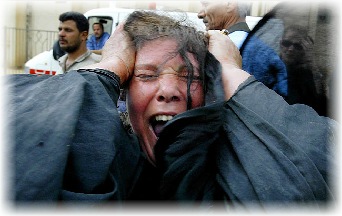 |
|
War is about
death |
War is
about death. To journalists, it is always about the waste of
human life. Without such waste, there would be no news.
War means waste. That's why we cry over the loss of any
life in war--especially over the innocent. We cry
when our troops are killed, when the enemy troops are killed.
I might even cry when Baghdad Bob dies. It will be a loss, as
severe as any other journalist who braved war's madness to report the
war, to tell about death and its waste.
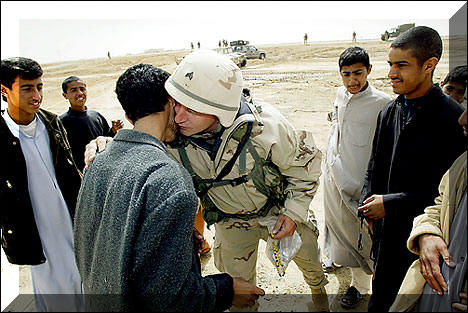 |
|
Iraqi giving
prayer beads to Marine: beauty in war |
In the last article published by Michael
Kelly, the first journalist to die in Iraq, he summed
up the beauty and ugliness of death. Here
is the lead paragraph from his last column published in
the Washington Post. It tells us a little about
the waste of war.
"Near the crest of the bridge across the Euphrates
that Task Force 3-69 Armor of the 1st Brigade of the 3rd
Infantry Division seized yesterday afternoon was a body
that lay twisted from its fall. He had been an old man
– poor, not a regular soldier – judging from his clothes.
He was lying on his back, not far from one of several
burning skeletons of the small trucks that Saddam Hussein's
willing and unwilling irregulars employed. The tanks and
Bradleys and Humvees and bulldozers and rocket launchers,
and all the rest of the massive stuff that makes up the
U.S. Army on the march, rumbled past him, pushing on."

April 7--No Decapitation Policy Says Kim Jong Il
©2001
- 2004, VigilanceVoice.com, All rights reserved -
a ((HYYPE))
design

|
| |
|
|